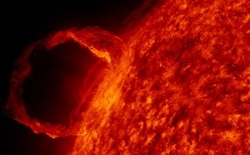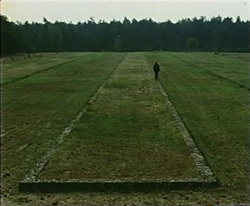Dear friends and colleagues,
Thank you for giving me the opportunity to speak today here about some of the questions I found myself struggling with, while reading and translating “Shoah” by Philippe Benichou.
Benichou’s paper talks about the Shoah. You cannot wonder, Benichou writes, what a "real for the twenty-first century" could be, without mentioning that event beyond meaning, real, all too real, the Shoah.
I was captivated but also puzzled by the power of this depiction of the Shoah as an “event beyond meaning, real, all too real”.
I asked myself, what could this mean?
Attempting to formulate an answer, I found myself faced with further questions:
What is an event? What is history? What is a historical event?
And then: What is real in a historical event?
This is how I will begin.

In other words, not all occurrences are events. In order to have an event we have to recognise it as an event. In a way one could say that an event is a product of a decision, a product of a gesture.
What this means is that humans need to be there, in order to observe the occurrence and decide that this is, or can be thought of as, an event. Humans decide to “single out” an event, so to speak, from a background of occurrences.
Of course this decision, this observation doesn’t need to be in real time, one does not need to be present at the exact moment something is happening. To bring an example, solar flares have been happening for many millions of years, and are happening this very moment as we speak; we only became aware of them, however, when we created a model in our minds about the inner workings of the Sun. From the moment we had a theory about how the Sun is working, then we could take this specific occurrence as an event, and call it a solar flare. The occurrence became an (astronomical) event as soon as we started thinking about it –when it started to concern us in some way.
As we speak, there are millions of stars out there, and there are happenings, there are solar flares –or more precisely “stellar” flares. They are happening now, as we speak, but strictly speaking they are not events. They are not events for us. They will become events from the moment we take the telescope to look at them. Or from the moment their effects obtain an importance for us, for some reason or the other.
So, this about events:
An event is a product of a decision; with this decision we distinguish something from its background.
What about historical events?
We have a historical event, or, to put it differently, an event becomes a historical event when it is incorporated in a greater narrative that involves a past and a future.
History is a narrative, it is an interpretation, and as such it involves a point of view and refers to a past and to a future. Thus, a historical event is an event that can be seen as part of a greater historical narrative.
An event cannot be thought as a historical event unless it affects the human affairs in some way, unless it is important for humans to speak about it and include it in their narrative. So, to bring an example, an earthquake is a geological event when it happens in some remote part of the Pacific, but becomes a historical event when it directly implicates humans, for example by creating a tsunami like the one in Indian Ocean in 2004. The tsunami of 2004 was a historical event, having affected or taken the lives of hundreds of thousands of people in many countries.
What is the real in a historical event?
I answer: Nothing.
There is no real in a historical event.
Let me explain.
A historical event is already a narrative; it is an interpretation and as such it involves an act of distinguishing. We distinguish something from occurrences, and call it an event. An event is already a discussion about something. The real was before that.
The real, if we can say that, is at the very level of the occurrence. The occurrence is the real. But from the moment that we decide to call something an event, there is no real any more.
“Moment” here is used in the sense of a logical moment, not a temporal one. At the exact logical moment that we recognise an event –historical or not– in an occurrence, what we do amounts to taking some of the real, of that occurrence so to speak, and transforming it into a signifier. That occurrence –now called event– is now able to signify something. In other words, the real of an occurrence is made into a signifier –it is signifierised as an event. So, an event is but a chunk of the real taken as a signifier.
The tricky part here is that we do not know what this signifier means. (We wouldn’t know that the real means either. The real never means anything.)
When we try to understand it, to include it in a narrative that involves a past and a future –in history, that is– we transform it into a historical event. Our interpretation allows us to think that we know what it means. We have history when we impose meaning onto all these signifiers which were there, available to us to add some meaning.
So, we can only know what we can take from the real, make it into a signifier and give it a meaning –give it a sense so to speak. This is what history is about.

As we saw, Philippe Benichou calls it “that event beyond meaning, real, all too real”.
Based on our discussion, how are we to understand this?
Why is it the case that the Shoah is beyond meaning? How are we to understand the assertion that something –anything– is beyond meaning?
Obviously, being beyond meaning does not mean to be meaningless.
One way to understand this is in the sense that meaning –any meaning– is not enough to enclose this event. As if the Shoah cannot be made into a narrative. As if, in some way, the Shoah remains off history.
Or to say it in a simpler way, it might be that the Shoah is simply too big, far too big to be captured as an event. Or, in other words, that not all of its real can be captured as an event.
Which now raises further questions. Is this whole discussion a discussion about scale and magnitude?
Do we say that the Shoah is “beyond meaning” because the Shoah is the biggest of all events? Does this mean that it was a singularity? A one-off?
Benichou attempts to discuss this in his paper. He brings up Jacques-Alain Miller:
Lacan does not say why it was the Jews, present for so long in Europe and part of its culture, who became the subject of this sacrifice. Jacques-Alain Miller proposed a reason within the Jewish tradition, which itself rejects the universal, the "for all" and assimilation. The Jews separate themselves, by making themselves the cause of the desire of their God, something that put them "in the place of a remainder". This remainder was throughout history the support of all fantasies of an Other who enjoys, enjoys money, enjoys the power of conspiring, and enjoys sacrificing the children of Christians... It was this remainder that the Nazis tried to make disappear.
This would mean that the Jews, in Jacques-Alain Miller’s view, have facilitated the work of their enemies by having put themselves in the place of a remainder which then was thought (by the Nazis) that it should be eliminated. The obvious implication is that the Shoah should not happen had the Jews not put themselves in the place of the remainder: If the Jews had positioned themselves differently in the culture of Europe during these 2000 years, then perhaps the Shoah would not have happened.
This of course is speculation. The fact of the matter is that the Shoah did happen.
Our questions then persist:
Was the Shoah a historical singularity? Was it a one-off?
Will something like the Shoah happen again? Can it happen again?
Of the top of my head I could think of Rwanda, Rwanda in 1994. They killed too many people there, fast and systematically.
My question takes then this form:
Have we really thought about Shoah? Is it possible to think about it? Is it possible to understand it? When we try to make an event out of this real, when we try to create a kind of narrative of the 20th Century, can we really enclose the Shoah, fully, in this narrative?
I am not sure about the answer, but I will quote Claude Lanzmann here –a French journalist, writer and filmmaker, the maker of a documentary called “Shoah”.
This is what Lanzmann said, talking to an American journalist about his work.
When I was making the "Shoah" I was like a horse with blinders. I did not look to the side, neither my right side nor my left side. I was trying to look straight into this black sun which is the Holocaust. And this blindness, this voluntary blindness was –is– a necessary requisite, the necessary condition for the creation. […] The only way to cope with this blinding reality it to blind one’s self to all kinds of explanation. To refuse the explanation. It is the only way. It was a moral attitude, an ethical touchstone.
To refuse all explanation. A difficult task.
But it’s only in this way that I can understand Benichou when he talks about “that event beyond meaning”.
Thank you for your attention.
 RSS Feed
RSS Feed